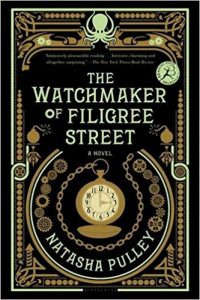 The Watchmaker of Filigree Street, by Natasha Pulley, takes place in London, but a London of the late 1800s, a time when the Irish were rebelling against British rule. Nathaniel “Thaniel” Steepleton works at one of the government offices as a telegraph operator. His life changes, however, when a watch he mysteriously finds in his room at a boarding house saves his life from a bomb by an alarm going off at just the right time. This begins a long and twisting journey in which he befriends the maker of the watch, Keita Miro, a Japanese nobelman, inventor and one-time assistant to an ambassador. He also crosses paths with one Grace Carrow, an ambitious young woman wishing to embark on a career in science — she wishes to prove the existence of the aether — but is thwarted because, during that time, women could not pursue such careers.
The Watchmaker of Filigree Street, by Natasha Pulley, takes place in London, but a London of the late 1800s, a time when the Irish were rebelling against British rule. Nathaniel “Thaniel” Steepleton works at one of the government offices as a telegraph operator. His life changes, however, when a watch he mysteriously finds in his room at a boarding house saves his life from a bomb by an alarm going off at just the right time. This begins a long and twisting journey in which he befriends the maker of the watch, Keita Miro, a Japanese nobelman, inventor and one-time assistant to an ambassador. He also crosses paths with one Grace Carrow, an ambitious young woman wishing to embark on a career in science — she wishes to prove the existence of the aether — but is thwarted because, during that time, women could not pursue such careers.
The story revolves around the relationships between Thaniel, Keita, and Grace and is devoted to developing these characters. Keita, in particular, harbors a powerful secret that drives much of the plot. Along the way, Pulley evokes a London of over 100 years ago, having done her research on the people and places of 19th century Britain. Her use of language is very adept, using phrases such as “the part of himself he had amputated still twinged somtimes,” to describe how Thaniel feels about having to have given up piano to get a real job, and “the spare room was crooked, as though it had planned to be L-shaped but changed its mind at the last minute,” to describe Thaniel’s room. This kind of word play makes reading this novel a joy.
The central theme of the story revolves around fate. Why do things happen? What is the role of luck or happenstance on those events. Why and how do we end up where we go in life? Pulley has invented a clever fictional device to drive her exploration of these ideas, while also driving an exciting plot, one that becomes a thriller near the end.
Not only does Pulley explore questions of fate, but she also examines the role of science in society. Grace is a typical scientist, awkward, socially inept, and driven to understand. At one point, one of the characters tells her “Your science can save a man’s life, but imagination makes it worth living.” I might quibble with the implication that science excludes imagination (as implied by Richard Feynman, science requires great imagination, more so than many other fields as it is constrained by and must be consistent with reality). However, the point is that there are multiple facets of a full life and all are part of a life worth living.